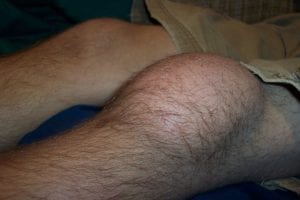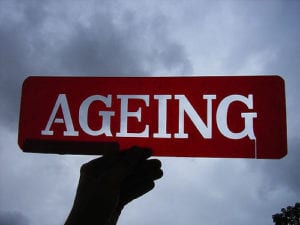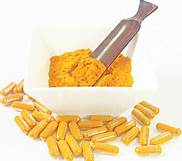 The most common cause of a swollen knee is when too much fluid gathers in or around the knee joint.
The most common cause of a swollen knee is when too much fluid gathers in or around the knee joint.
To some people it is called fluid or water on the knee, the medical term for the condition is an effusion of the knee joint.
Other swollen knee causes could be a result of knee trauma (bang on the knee) overuse of the injured knee or perhaps an underlying condition or disease.
Your doctor will determine the primary cause and recommend an appropriate treatment, some of the fluid may be removed to help with reducing the stiffness and pain linked to the swelling.
Symptoms of a swollen knee
The signs & symptoms of a swollen knee are:
- Swelling: The area surrounding the kneecap can noticeably puff up, the affected knee looks much bigger than the other knee
- Pain: The cause of the swelling will have a direct bearing on how painful the skin area around the knee is, in certain cases, it will be very difficult to put any weight on the leg.
- Stiffness: The excess fluid around the kneecap will make it hard to bend or straighten the leg fully
When should you go to see a Doctor?
If you have tried taking over-the-counter painkillers but the swelling and pain aren’t going away or if one knee feels warm to the touch or it may be red. You may also have tried using an ice pack to no avail.
- ACL or anterior cruciate injury occurs when the ACL is stretched, partially torn, or fully torn. The most common type of ACL is a complete tear, the symptoms consist of pain, unstable knee, and joint swelling.
- Torn meniscus
This is one of the most common types of knee injuries, a torn meniscus can happen if you put some force behind your knee when you twist or rotate it, this is quite common with sports activities like soccer or football.
The menisci are cartilage shaped like a C that is found in your knees, they form a cushion between the shinbone and the thigh bone. Should the meniscus become torn it will lead to swelling, pain, and stiffness, it may also cause trouble when trying to extend the knee out.
Symptoms of a torn meniscus include;
- Swelling or stiffness
- A feeling that the knee has popped out
- Sharp pain when twisting or turning
- Difficulty when trying to straighten the knee fully
- The knee feels locked at times
A variety of causes
There are a variety of issues that cause swollen knees they range from trauma-type injuries to disease and other conditions
Knee Injuries
Any type of injury to the knee can induce excess fluid to gather around the knee joint, types of injuries include:
- Meniscus tear
- A broken bone
- ACL or torn ligament
Diseases and conditions
Hidden conditions and diseases capable of producing a build-up of excess fluid in and near the knee joint include:
- Bursitis
- A cyst
- Infection
- Pseudogout
- Rheumatoid arthritis
- A tumor
- Osteoarthritis
 Risk factors for a swollen knee
Risk factors for a swollen knee
- Ageing: As we age the chances of getting a swollen knee increase
- Obesity: Being overweight puts added pressure on the joints especially the knee and hip joints causing a deterioration leading to a swollen knee.
- Osteoarthritis is a common cause of knee and joint swelling obesity compounds the risk of osteoarthritis.
- Sports: Many sports people suffer from swollen knees especially those sports where there is a lot of twisting and leg turning sports like basketball, soccer, rugby, and ice hockey.
Swollen knee complications
Some complications come with a swollen knee and they are:
- Loss of muscle: The build-up of fluid in the knee may cause harm to the way the muscles work especially the thigh muscles which may weaken and waste away.
- Fluid-filled sac: Also known as Baker’s cyst which can form in the knee as a result of the swelling, this complication can be extremely painful and may have to be removed.
Swollen knee prevention
How do you prevent a swollen knee from happening? Typically swollen knee is caused by a chronic health condition or an injury, to enable better health and prevent an injury.
- Control your weight being overweight puts pressure on the joints and can lead to wear and tear on the knee causing swelling
- Knee exercises: Exercise that builds up the knee muscles may help to ease pressure
- Low-impact exercises: Like swimming, try water aerobics these activities put less strain on the knee joints

Recommended for swollen knee swelling and reduction
Curcumin has been used for centuries for swelling and pain relief, it is a natural anti-inflammatory, and it has been proven to reduce swelling and pain.
Take 1-2 capsules daily with water on an empty stomach one hour before eating. Curcumin is safe to take with other medications with few reported side effects, here are just some of the benefits
- All-Natural Support for Proper Inflammatory Response
- Supports Healthy Muscles and Joints
- Promotes Proper Immune System Function
- Supports Proper Recovery Times After Strenuous Exercise
- Promotes Healthy Brain Function
- Promotes Faster Training Recovery




Hi Fintan, I must say that this article is very helpful and informative. A swollen knees is very common today and not so many people actually know to cure that. My dad has the same problem and I would never remember turmeric. I hear about its benefits but I did not know that it is good for swollen knees. I will definitely recommend it to my dad.
This is helpful information on swollen knee issues and taking Curcumin to alleviate the pain and swelling. My husband has RA, and frequently has swollen joints, and his doctor recommended a similar anti-inflammatory supplement similar to Curcumin. I’m glad you recommend at the beginning to visit with your doctor about a swollen knee. Thank you again for the info. Rhonda